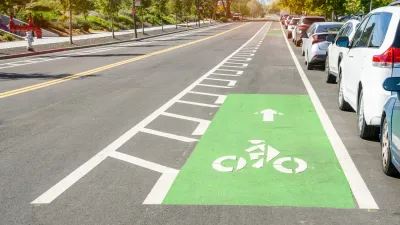A proposed ordinance that would allow neighborhood associations to request removal of bike lanes has sparked a debate over how to prioritize bike and pedestrian infrastructure.

A proposed ordinance regulating bike lanes in Kansas City has sparked a broader debate about "the quality of the city’s streets and sidewalks, about the neighborhoods that are prioritized for improvements and the ones left behind, about equity and whose voices are heard," writes Celisa Calacal.
The ordinance, introduced by Councilwoman Melissa Robinson, drew controversy for its inclusion of language that lets the city remove existing bike lanes at the request of neighborhood associations. The councilwoman says she supports bike lanes, but points to other unmet needs in some of the city's most underserved neighborhoods. According to Robinson, "The deepest socially and economically disadvantaged communities depend on public transit, and their mobility is walking." For her, this signals a need for boosting funding for sidewalk repairs and improvements. But complete streets advocates reject Robinson's framing of bike lanes and sidewalks as priorities in opposition to each other.
While Robinson says the ordinance is meant to respond to resident concerns, Michael Kelley, policy director of BikeWalkNC, notes that the position of neighborhood associations often doesn't include "a whole swath of the community that deserves to have a say in improvements, which will impact their safety." The debate continues as the city moves forward with the ordinance.
FULL STORY: How an ordinance over bike lanes became a flashpoint for conversations about Kansas City infrastructure

Planetizen Federal Action Tracker
A weekly monitor of how Trump’s orders and actions are impacting planners and planning in America.

San Francisco's School District Spent $105M To Build Affordable Housing for Teachers — And That's Just the Beginning
SFUSD joins a growing list of school districts using their land holdings to address housing affordability challenges faced by their own employees.

The Tiny, Adorable $7,000 Car Turning Japan Onto EVs
The single seat Mibot charges from a regular plug as quickly as an iPad, and is about half the price of an average EV.

Seattle's Plan for Adopting Driverless Cars
Equity, safety, accessibility and affordability are front of mind as the city prepares for robotaxis and other autonomous vehicles.

As Trump Phases Out FEMA, Is It Time to Flee the Floodplains?
With less federal funding available for disaster relief efforts, the need to relocate at-risk communities is more urgent than ever.

With Protected Lanes, 460% More People Commute by Bike
For those needing more ammo, more data proving what we already knew is here.
Urban Design for Planners 1: Software Tools
This six-course series explores essential urban design concepts using open source software and equips planners with the tools they need to participate fully in the urban design process.
Planning for Universal Design
Learn the tools for implementing Universal Design in planning regulations.
Smith Gee Studio
City of Charlotte
City of Camden Redevelopment Agency
City of Astoria
Transportation Research & Education Center (TREC) at Portland State University
US High Speed Rail Association
City of Camden Redevelopment Agency
Municipality of Princeton (NJ)





























